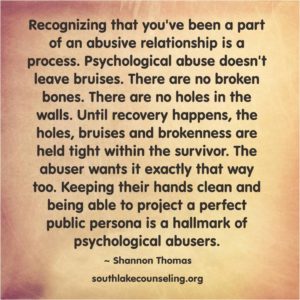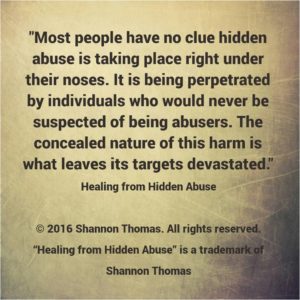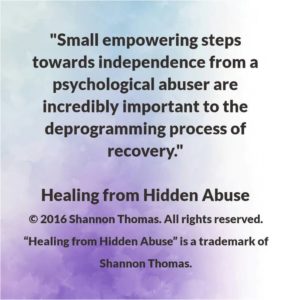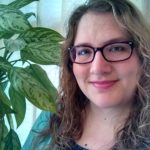Hidden Abuse : a reflection and book review
by Jennifer Alumbaugh, LMFT
I’ve had the honor of reading an advance copy of Healing from Hidden Abuse by Shannon Thomas, LCSW in exchange for my feedback and honest review. Even before this book came out, I have been impressed with the integrity of Thomas’ reflections on psychological, emotional, and spiritual abuse from both the theological and the psychological standpoint. As a Licensed Marriage and Family Therapist with a degree in Theology and a personal history in a number of church communities, it is not often I encounter material that resonates with such unapologetic and unfaltering truth. Thomas’ Healing from Hidden Abuse is one such book.
 Healing from Hidden Abuse is organized into several parts: introduction with background on the 2016 research project, “Examining Patterns of Psychological Abuse;” moving into the Basics of Psychological Abuse—a kind of 101 primer for anyone previously unfamiliar; the Six Stages of Recovery: Despair, Education, Awakening, Boundaries, Restoration, Maintenance; an address to family and friends of survivors; a resource section including a bibliography; and a collection of personal reflection and journal prompts to move the reader through their own process or to facilitate group process.
Healing from Hidden Abuse is organized into several parts: introduction with background on the 2016 research project, “Examining Patterns of Psychological Abuse;” moving into the Basics of Psychological Abuse—a kind of 101 primer for anyone previously unfamiliar; the Six Stages of Recovery: Despair, Education, Awakening, Boundaries, Restoration, Maintenance; an address to family and friends of survivors; a resource section including a bibliography; and a collection of personal reflection and journal prompts to move the reader through their own process or to facilitate group process.
In both my personal healing process and my professional clinical work with clients, when I consider materials to use or recommend, I look for several things:
Does the material have substance? I tend to shy away from materials that are too geared toward the beginner in self-awareness. I want something that is accessible to both the novice and the seasoned professional. I look for content that will inform, challenge, and inspire me.
Is the information clinically sound? Is there research and data that backs up the claims the author is making? Does the author have personal and/or professional experience in the field? —I want to be able to trust the author. I also evaluate whether or not the content holds water when I consider my own research, education, training, and clinical experience.
Is it clinically substantial while at the same time accessible to laypeople who are not mental health professionals and who may not be as familiar with the language of the profession? I want to use material that can connect with people who are engaging from a variety of professions, education levels, and experiences.
Is the language inclusive and intersectional? Is there an over-all cultural competence across a variety of identities? Especially in this time, I keep a look out for material that is gender and identity inclusive and retains minimal to no assumptions about identity and relationships.
Is there any bias in the content—skewed toward one experience over another—rather than encompassing the broad range of possible experiences?
 I’m pleased to report that Thomas’ work meets or exceeds my criteria, for the most part. While there is attention to dispelling the myths about abusers being only certain genders, there is a use of binary gender terms.
I’m pleased to report that Thomas’ work meets or exceeds my criteria, for the most part. While there is attention to dispelling the myths about abusers being only certain genders, there is a use of binary gender terms.
This book is deeply relevant and meaningful to anyone who has survived psychological and spiritual abuse from parents, pastors, partners, co-workers, friends, and others in their community. Beyond my resounding recommendation of this book to anyone who has or is surviving “Hidden Abuse,” I recommend it to anyone who loves, supports, is friends with a survivor. The education and insight available in this book is valuable to anyone striving to cultivate healthy, authentic, and loving relationships free from toxic dynamics.
In addition to being a mental health professional who supports others in their healing and recovery process, I have personally experienced psychological and spiritual abuse and continue to do the work of maintaining my recovery. It is these experiences especially which have motivated and inspired me to enrich my education and training in this specific area in order to be able to serve clients in need of this particular healing work. I center my own work as well as the process through which I guide my clients, in love and truth. What comes under attack with psychological and spiritual abuse is the truth, and learning to trust one’s self, one’s own intuition, and even one’s own spiritual experience is a core component in the healing process. Many survivors of psychological abuse have had the profoundly invalidating experience of not being believed when they reach out to others for help. If you receive nothing else from this blog post, I hope it is this truth:
I believe you. You matter. Your experiences, your pain, your grief, is real. There is a way out of despair. You don’t have to suffer alone or in silence. You are worthy of Love. You deserve to live a thriving life, as your whole and authentic self.
 I will be using this text in my practice with clients individually, as a group facilitator, and as a professional development consultant providing trainings to various community agencies—police departments, domestic violence programs and shelters, and other mental and social service organizations. If you have had or think you may have had an experience with psychological or spiritual abuse and would like some support in sorting through the recovery process, or if you are connected to an agency interested in a professional development training on psychological abuse, please contact me through the Enrichment Contact Us page.
I will be using this text in my practice with clients individually, as a group facilitator, and as a professional development consultant providing trainings to various community agencies—police departments, domestic violence programs and shelters, and other mental and social service organizations. If you have had or think you may have had an experience with psychological or spiritual abuse and would like some support in sorting through the recovery process, or if you are connected to an agency interested in a professional development training on psychological abuse, please contact me through the Enrichment Contact Us page.
 Jennifer Alumbaugh, MS is a Licensed Marriage and Family Therapist providing clinical and professional development consultation services at Enrichment Training and Counseling Solutions. She has extensive experience working with adolescent and adult survivors of psychological and spiritual abuse, trauma (sexual violence, childhood trauma, interpersonal violence); and complex PTSD. These, along with grief and loss work are her areas of specialization. Jennifer practiced as a mental health clinician throughout Los Angeles County working with children, youth, and their families from 2007-2012. In Central Texas, Jennifer has worked as a Site Coordinator with Communities in Schools of The Heart of Texas at G.W. Carver Middle School; as an independent consultant and professional development trainer; and conference speaker. In 2016 Jennifer created an implemented a therapeutic creative writing program, Brave Young Voices, at Klaras Center for Families and at the Texas Juvenile Justice Department correctional campus at Mart, TX. She may be reached at: [email protected] or 254-405-2496.
Jennifer Alumbaugh, MS is a Licensed Marriage and Family Therapist providing clinical and professional development consultation services at Enrichment Training and Counseling Solutions. She has extensive experience working with adolescent and adult survivors of psychological and spiritual abuse, trauma (sexual violence, childhood trauma, interpersonal violence); and complex PTSD. These, along with grief and loss work are her areas of specialization. Jennifer practiced as a mental health clinician throughout Los Angeles County working with children, youth, and their families from 2007-2012. In Central Texas, Jennifer has worked as a Site Coordinator with Communities in Schools of The Heart of Texas at G.W. Carver Middle School; as an independent consultant and professional development trainer; and conference speaker. In 2016 Jennifer created an implemented a therapeutic creative writing program, Brave Young Voices, at Klaras Center for Families and at the Texas Juvenile Justice Department correctional campus at Mart, TX. She may be reached at: [email protected] or 254-405-2496.
The Act Locally Waco blog publishes posts with a connection to these Aspirations for Waco. If you are interested in writing for the Act Locally Waco Blog, please email [email protected] for more information.
